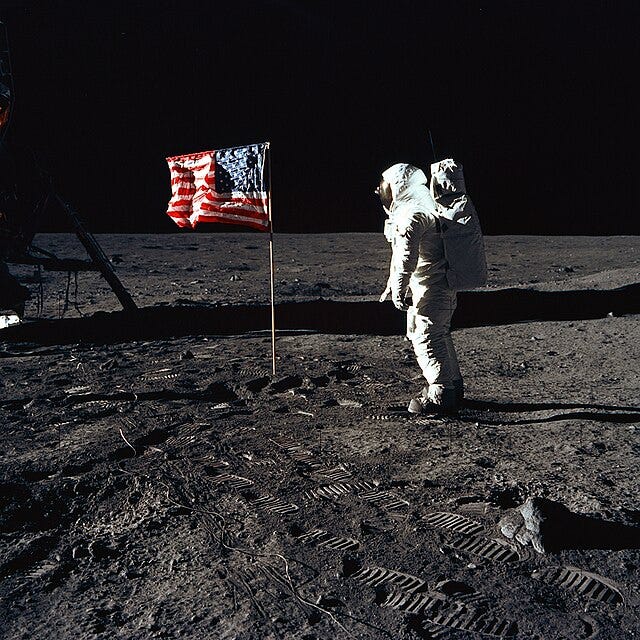The Next Great American Export: Talent
We don’t need foreign rivals to steal American talent. We’re packing their bags for them.
This week, we’re talking:
How a kid from Albuquerque rode America’s science boom—and why the same machine that launched NASA and the Internet is now on life support. 🚀🖥️⚠️
Why one antitrust ruling could pry open Google’s walled garden—reshaping the AI race (if regulators don’t blow it). ⚖️🔍🤖
How the Twitter Files blueprint—dump, distort, and deputize the mob—became the default playbook for today’s conspiracy-fueled info wars. 🗂️🌀👥
Can AI offer the kind of undivided, judgment-free attention humans rarely manage—and what does that mean for the future of the humanities? 🤖📚🌀
A diamond-studded Ponzi circus featuring Kardashians, crypto scams, and the Houdini of white-collar crime: Jona Rechnitz. 💎🕳️💰
The U.S. dollar has long ruled the world—but is America’s financial superpower finally running out of road? 💵🌍⚠️
My Take:
I grew up in Albuquerque, a child of what Eisenhower called the military-industrial complex. Both my parents worked at Sandia National Labs — my mom as a secretary, my dad as a graphics illustrator. They spent their days watching scientists working on big hulking machines covered in blinking lights and spent their nights telling their five children over dinner: "We don’t know what those guys are doing with the computers, but that’s the future.”
They were right.
By eighth grade, I was bussing to UNM to take my first computer science course. Summers were spent writing Fortran programs at Sandia and Kirtland Air Force Base. Five years later, NASA paid for my graduate studies in engineering.
None of it was an accident. My family and I were direct beneficiaries of one of the smartest national investments America ever made: the National Defense Education Act of 1958.
When the Soviets launched Sputnik, the U.S. freaked out — and instead of banning books or burning scientists at the stake, we funneled 2.5% of our GDP into basic research, education, and technology.
The result?
NASA. DARPA. The Internet.
The moon landing.
The greatest knowledge-creation machine in human history.
Today, that machine is being stripped for parts. The NIH and NSF are being hollowed out. Universities are being threatened to bow to political pressure or lose their funding.
The immigrants who have long fueled America's breakthroughs — 35% of our Nobel Prize winners, 39% of our software developers — are being shoved out the door.
Meanwhile, China isn’t arguing about whether knowledge matters. They’re sprinting. In 2010, China had 27 universities ranked in the world’s top 500. By 2020, it had 76. Today, China processes almost half the world’s patent applications.
And we’re busy eating the seed corn our grandparents planted.
Here’s the uncomfortable truth:
If you gut research, kneecap universities, and shut out immigrants, you’re not protecting America — you’re dismantling it. You torch the entire economy. You wreck the future.
Nature, the preeminent scientific publication, recently polled its readers about whether they were thinking of leaving the U.S. Of the more than 1,600 who responded, 75% said they were.
If they go, they’re not coming back.
And it’ll take a hundred years — at least — to rebuild what we’re tearing down right now.
It’s not if we fall.
It’s how hard we hit —
and whether anyone’s left to pick up the pieces.
My Media Diet:
Why the A.I. Race Could Be Upended by a Judge’s Decision on Google by David McCabe via NYTimes ⚖️🔍🤖
The government has asked the court to force Google to sell its Chrome browser and share data with rivals, including its search results and ads, among other measures. Government requests for fixing monopolies are forward-looking by nature, attempting to undo years of damaged competition and opening markets to new rivals. From the government’s perspective, “you do not want to have spent five years and a whole bunch of agency resources bringing a case that doesn’t really do anything,” said John Newman, the deputy director of the Federal Trade Commission’s Bureau of Competition during the Biden administration.
Everything Is the ‘Twitter Files’ Now by Charlie Warzel via The Atlantic 🗂️🌀👥
For many, the Twitter Files were just another ephemeral culture-war skirmish. But for the MAGA sympathetic and right-leaning free-speech-warrior crowds, the files remain a canonical, even radicalizing event. RFK Jr. has argued on prime-time television that “I don’t think we’d have free speech in this country if it wasn’t for Elon Musk” opening up Twitter’s archives. Similarly, individuals mentioned in the files, such as the researcher and Atlantic contributor Renée DiResta, have become objects of obsession to MAGA conspiracy theorists… As Musk proved with the Twitter Files, Beattie and the State Department don’t even need to do the dirty work of sifting through or presenting the information themselves. They can outsource that work to a handpicked network of sympathetic individuals or news outlets—or, for maximum chaos, they can release the raw information to the public in the name of pure transparency and let them make their own connections and judgments.
Will the Humanities Survive Artificial Intelligence? by D. Graham Burnett via The New Yorker 🤖📚🌀
What this student had come to say was that she had descended more deeply into her own mind, into her own conceptual powers, while in dialogue with an intelligence toward which she felt no social obligation. No need to accommodate, and no pressure to please. It was a discovery—for her, for me—with widening implications for all of us… She had gone to the machine to talk about the callow and exploitative dynamics of commodified attention capture—only to discover, in the system’s sweet solicitude, a kind of pure attention she had perhaps never known. Who has? For philosophers like Simone Weil and Iris Murdoch, the capacity to give true attention to another being lies at the absolute center of ethical life. But the sad thing is that we aren’t very good at this. The machines make it look easy.
How to Scam Like A Celebrity by Miranda Green via Atavist Magazine 💎🕳️💰
“He said, ‘Either you drop the case against me or I’m going to bring up this whole thing about you being a tax cheat,’ ” Englanoff recounted. “And I said, ‘It’s not true.’ His response: ‘Who cares about truth? Once I get your good name through the mud, try and get it back.’ Rechnitz’s alleged victims—jewelers, landlords, and investors—have spent years chasing millions they say he owes, while Rechnitz insists he’s the real victim. All the while, lawsuits swirl, subpoenas fly, and the FBI quietly circles. Yet somehow, Jona Rechnitz is still out there—hobnobbing courtside, shaking hands in Jerusalem, and dodging prison like it’s just another Beverly Hills hustle.”





I couldn't agree more Tom. The hollowing out of the US education system by making immigrants unwelcome is one of the most dangerous things for the long-term viability of the US economy